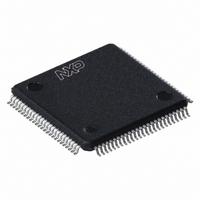LPC1767FBD100,551 NXP Semiconductors, LPC1767FBD100,551 Datasheet - Page 343

LPC1767FBD100,551
Manufacturer Part Number
LPC1767FBD100,551
Description
IC ARM CORTEX MCU 512K 100-LQFP
Manufacturer
NXP Semiconductors
Series
LPC17xxr
Datasheets
1.LPC1767FBD100551.pdf
(2 pages)
2.LPC1767FBD100551.pdf
(840 pages)
3.LPC1767FBD100551.pdf
(65 pages)
Specifications of LPC1767FBD100,551
Core Processor
ARM® Cortex-M3™
Core Size
32-Bit
Speed
100MHz
Connectivity
Ethernet, I²C, IrDA, Microwire, SPI, SSI, UART/USART
Peripherals
Brown-out Detect/Reset, DMA, I²S, Motor Control PWM, POR, PWM, WDT
Number Of I /o
70
Program Memory Size
512KB (512K x 8)
Program Memory Type
FLASH
Ram Size
64K x 8
Voltage - Supply (vcc/vdd)
2.4 V ~ 3.6 V
Data Converters
A/D 8x12b, D/A 1x10b
Oscillator Type
Internal
Operating Temperature
-40°C ~ 85°C
Package / Case
100-LQFP
Processor Series
LPC17
Core
ARM Cortex M3
3rd Party Development Tools
MDK-ARM, RL-ARM, ULINK2, MCB1760, MCB1760U, MCB1760UME
For Use With
622-1005 - USB IN-CIRCUIT PROG ARM7 LPC2K
Lead Free Status / RoHS Status
Lead free / RoHS Compliant
Eeprom Size
-
Lead Free Status / Rohs Status
Details
Other names
568-4967
935289808551
935289808551
Available stocks
Company
Part Number
Manufacturer
Quantity
Price
Company:
Part Number:
LPC1767FBD100,551
Manufacturer:
NXP Semiconductors
Quantity:
10 000
- Current page: 343 of 840
- Download datasheet (6Mb)
16.1 Basic configuration
16.2 CAN controllers
16.3 Features
UM10360
User manual
16.3.1 General CAN features
The CAN1/2 peripherals are configured using the following registers:
Controller Area Network (CAN) is the definition of a high performance communication
protocol for serial data communication. The CAN Controller is designed to provide a full
implementation of the CAN-Protocol according to the CAN Specification Version 2.0B.
Microcontrollers with this on-chip CAN controller are used to build powerful local networks
by supporting distributed real-time control with a very high level of security. The
applications are automotive, industrial environments, and high speed networks as well as
low cost multiplex wiring. The result is a strongly reduced wiring harness and enhanced
diagnostic and supervisory capabilities.
The CAN block is intended to support multiple CAN buses simultaneously, allowing the
device to be used as a gateway, switch, or router among a number of CAN buses in
various applications.
The CAN module consists of two elements: the controller and the Acceptance Filter. All
registers and the RAM are accessed as 32-bit words.
1. Power: In the PCONP register
2. Peripheral clock: In the PCLKSEL0 register
3. Wake-up: CAN controllers are able to wake up the microcontroller from Power-down
4. Pins: Select CAN1/2 pins through the PINSEL registers and their pin modes through
5. Interrupts: CAN interrupts are enabled using the CAN1/2IER registers
6. CAN controller initialization: see CANMOD register
•
•
•
UM10360
Chapter 16: LPC17xx CAN1/2
Rev. 2 — 19 August 2010
Remark: On reset, the CAN1/2 blocks are disabled (PCAN1/2 = 0).
PCLK_CAN2, and, for the acceptance filter, PCLK_ACF. Note that these must all be
the same value.
Remark: If CAN baud rates above 100 kbit/s (see
select the IRC as the clock source (see
mode, see
the PINMODE registers
Interrupts are enabled in the NVIC using the appropriate Interrupt Set Enable register.
Compatible with CAN specification 2.0B, ISO 11898-1.
Multi-master architecture with non destructive bit-wise arbitration.
Bus access priority determined by the message identifier (11-bit or 29-bit).
Section
All information provided in this document is subject to legal disclaimers.
Rev. 2 — 19 August 2010
4.8.8.
(Section
(Table
8.5).
46), set bits PCAN1/2.
Table
(Table
17).
Table
40), select PCLK_CAN1,
(Section
322) are needed, do not
16.7.1).
© NXP B.V. 2010. All rights reserved.
(Table
User manual
343 of 840
321).
Related parts for LPC1767FBD100,551
Image
Part Number
Description
Manufacturer
Datasheet
Request
R

Part Number:
Description:
32-bit ARM Cortex-M3 microcontroller; up to 512 kB flash and 64 kB SRAM with Ethernet, USB 2.0 Host/Device/OTG, CAN
Manufacturer:
NXP [NXP Semiconductors]
Datasheet:
Part Number:
Description:
NXP Semiconductors designed the LPC2420/2460 microcontroller around a 16-bit/32-bitARM7TDMI-S CPU core with real-time debug interfaces that include both JTAG andembedded trace
Manufacturer:
NXP Semiconductors
Datasheet:

Part Number:
Description:
NXP Semiconductors designed the LPC2458 microcontroller around a 16-bit/32-bitARM7TDMI-S CPU core with real-time debug interfaces that include both JTAG andembedded trace
Manufacturer:
NXP Semiconductors
Datasheet:
Part Number:
Description:
NXP Semiconductors designed the LPC2468 microcontroller around a 16-bit/32-bitARM7TDMI-S CPU core with real-time debug interfaces that include both JTAG andembedded trace
Manufacturer:
NXP Semiconductors
Datasheet:
Part Number:
Description:
NXP Semiconductors designed the LPC2470 microcontroller, powered by theARM7TDMI-S core, to be a highly integrated microcontroller for a wide range ofapplications that require advanced communications and high quality graphic displays
Manufacturer:
NXP Semiconductors
Datasheet:
Part Number:
Description:
NXP Semiconductors designed the LPC2478 microcontroller, powered by theARM7TDMI-S core, to be a highly integrated microcontroller for a wide range ofapplications that require advanced communications and high quality graphic displays
Manufacturer:
NXP Semiconductors
Datasheet:
Part Number:
Description:
The Philips Semiconductors XA (eXtended Architecture) family of 16-bit single-chip microcontrollers is powerful enough to easily handle the requirements of high performance embedded applications, yet inexpensive enough to compete in the market for hi
Manufacturer:
NXP Semiconductors
Datasheet:

Part Number:
Description:
The Philips Semiconductors XA (eXtended Architecture) family of 16-bit single-chip microcontrollers is powerful enough to easily handle the requirements of high performance embedded applications, yet inexpensive enough to compete in the market for hi
Manufacturer:
NXP Semiconductors
Datasheet:
Part Number:
Description:
The XA-S3 device is a member of Philips Semiconductors? XA(eXtended Architecture) family of high performance 16-bitsingle-chip microcontrollers
Manufacturer:
NXP Semiconductors
Datasheet:

Part Number:
Description:
The NXP BlueStreak LH75401/LH75411 family consists of two low-cost 16/32-bit System-on-Chip (SoC) devices
Manufacturer:
NXP Semiconductors
Datasheet:

Part Number:
Description:
The NXP LPC3130/3131 combine an 180 MHz ARM926EJ-S CPU core, high-speed USB2
Manufacturer:
NXP Semiconductors
Datasheet:

Part Number:
Description:
The NXP LPC3141 combine a 270 MHz ARM926EJ-S CPU core, High-speed USB 2
Manufacturer:
NXP Semiconductors

Part Number:
Description:
The NXP LPC3143 combine a 270 MHz ARM926EJ-S CPU core, High-speed USB 2
Manufacturer:
NXP Semiconductors

Part Number:
Description:
The NXP LPC3152 combines an 180 MHz ARM926EJ-S CPU core, High-speed USB 2
Manufacturer:
NXP Semiconductors

Part Number:
Description:
The NXP LPC3154 combines an 180 MHz ARM926EJ-S CPU core, High-speed USB 2
Manufacturer:
NXP Semiconductors











